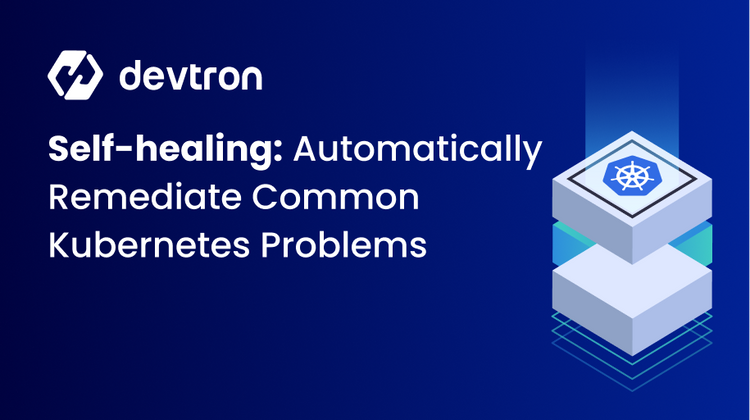Kubernetes has been one of the most adopted technologies in recent years. With its features such as automatic deployments, auto-healing, scaling applications, and a lot more, it has been able to capture the eyeballs of the industry. While many adopted Kubernetes or are in the process of Kubernetes adoption, one cannot ignore the complexities that it brings with it. A lot of platforms and dashboards have been built to deal with the complexities that Kubernetes brings in and OpenLens and Devtron are two of those.
In this blog, we will talk in brief about OpenLens and Devtron, and a detailed feature comparison that would help you choose the right Kubernetes Dashboard for your requirements.
So, let’s get started.
What is OpenLens?
OpenLens is the open-source code that brings out the core functionalities of the Kubernetes IDE i.e, Lens. As per the official definition, the repository OpenLens is the platform where the community and the Lens team collaborate to bring out new features and build the Lens IDE. The entire source code for OpenLens is present in the Lens GitHub repository, licensed under MIT License. Though it is one of the most adopted Kubernetes IDE, the installation is a bit tedious. From the website, you can download the Lens Desktop but it comes with a subscription and for OpenLens, there’s no clear instruction to download the IDE. However, thanks to the community for creating a lot of resources to ease the path and contributors like Muhammed Kalkan who is maintaining a separate repo for OpenLens builds from where you can download the latest version of the IDE for your operating system with all the open source components.
Is OpenLens enough for your Organization?
OpenLens is a Kubernetes IDE that gives a lot of comfort to DevOps/SRE engineers in managing the Kubernetes clusters and workloads. It comes with a lot of features like resource grouping of all the k8s resources (like Deployments, StatefulSets, Jobs, Ingress, etc) within the cluster, helm chart release management, and cluster management which focuses on simplifying the life of the operations team. However, managing deployment is just a part of the Software Development Lifecycle (SDLC) that every organization aligns with.
Talking about the Software Development Lifecycle (SDLC), OpenLens/Lens might not be a good fit for your organization. In the entire SDLC process, there are multiple stages, from writing code to building, testing, deploying, and managing the entire lifecycle. You can rely on OpenLens for managing your deployments and helm release but still, you would need other tools like Jenkins, CircleCI, etc for automating the other aspects of your value chain.
What is Devtron? Is it enough for your Organization?
Devtron is a 100% open-source Kubernetes Dashboard that comes with a lot of different integrations of cloud-native open-source tools and helps you manage all your Kubernetes workloads, multi-cloud Kubernetes clusters, all your helm releases, and a lot more. It is built in a modular fashion which primarily comes with two major modules -
- Kubernetes Dashboard by Devtron
- Kubernetes Dashboard by Devtron with CI/CD
Devtron provides an intuitive web interface that enables the development teams and operations team to interact with Kubernetes and also collaborate together and accelerate the software development journey. It offers the flexibility to integrate integrations such as CI/CD, GitOps, Security, Monitoring, etc as the requirements increase and enables teams to deploy and manage all your Kubernetes applications along with the Kubernetes clusters.
Talking about the Software Development Lifecycle (SDLC), Devtron is all you need to build, test, deploy and manage all your Kubernetes workloads with a slick user interface for better team collaboration. The self-hosted web-based Kubernetes Dashboard also focuses on extracting out all the complexities of the domain and providing flexibility and scalability to the organization’s value chain practices.
Now let’s compare the two powerful open-source Kubernetes Dashboards feature-by-feature that would help you choose the right dashboard for your requirements.
Devtron vs OpenLens: Feature Breakdown
* It was available before version v6.3.0 but has been removed from this version onwards and available under commercial offering Lens IDE. To follow the actual discussion please check GitHub issues - #6823, #6819, or Reddit discussion.
** Devtron doesn't rely on Kubernetes RBAC/kubeconfig for providing access making it easier to provide and remove access.
*** Multi pod log is a long pending request with OpenLens but with logs removed in version v6.3.0, it seems unlikely that it will be accepted.
Conclusion
Congratulations! You made it to the end. In this blog, we talked about two powerful Kubernetes Dashboards and how they differ from each other. Depending upon the Feature Breakdown focused on the dashboard, you can choose your dashboard as per your requirements.
If you'd like to try Devtron you can download it directly from the Devtron Github repo or you can request a demo if you'd like a guided tour.
If you liked the blog, do share it and give your feedback. Do join the devtron discord community to stay on top of all the latest features and updates.
Feel free to explore Devtron. Star us if you liked the project. Star




